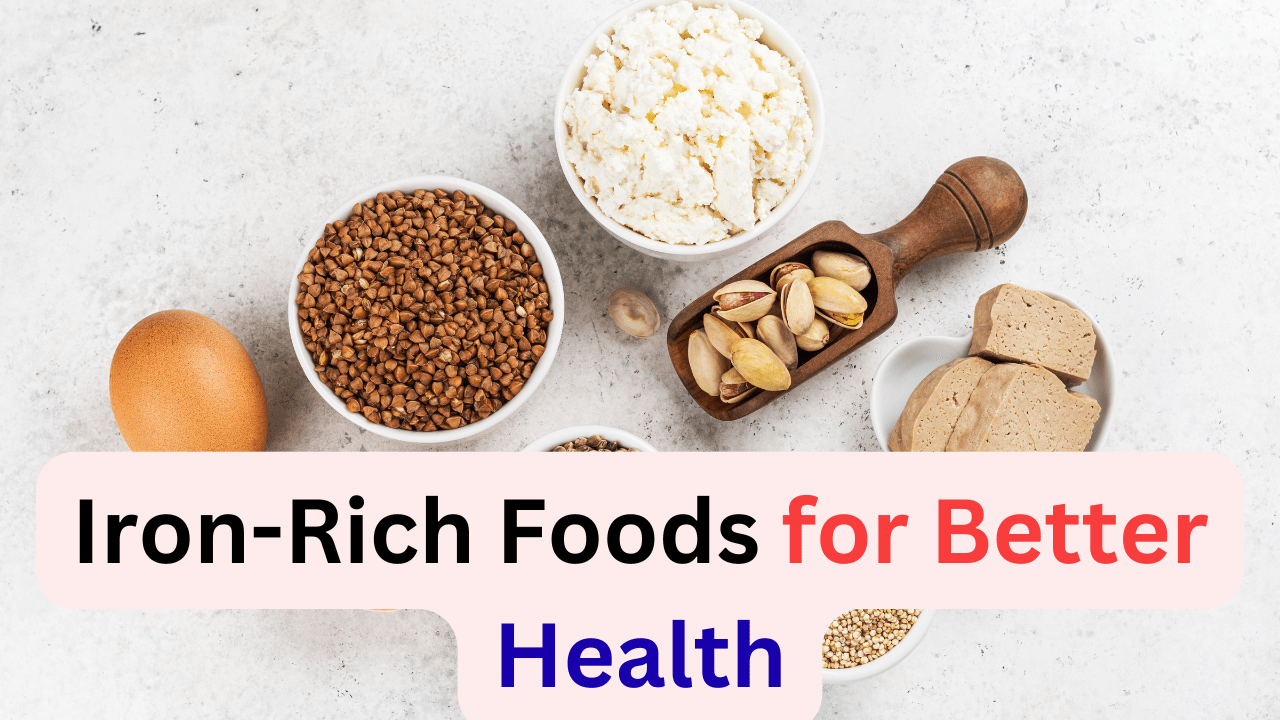Iron is one of the most important minerals for the human body. It plays a critical role in producing hemoglobin, a protein in red blood cells that carries oxygen throughout your body. Without enough iron, you may experience fatigue, weakness, and even anemia.
In this article, you will learn about “why iron is important”. We will discuss the different types of iron. We will also include the best iron-rich foods, both plant-based and animal-based.
Why Iron Is Important for our body?
Iron supports several vital functions in your body:
- Oxygen Transport: Iron helps carry oxygen from your lungs to all parts of your body.
- Energy Production: Iron supports metabolism and energy levels.
- Brain Function: Adequate iron improves focus and cognitive performance.
A deficiency in iron can lead to anemia, leaving you feeling constantly tired and weak.
Also read : Healthy Lifestyle Tips for a Better and Successful Life
Types of Iron : Heme iron vs. Non-Heme iron
There are two main types of iron found in foods:
- Heme Iron: Found in animal products like meat and seafood. It is more easily absorbed by the body.
- Non-Heme Iron: Found in plant-based foods like beans, lentils, and spinach. Its absorption can be enhanced by consuming vitamin C-rich foods.
Top 10 Iron-Rich Foods for Better Health
1. Red Meat (Beef and Lamb)
- Iron Content: ~2.7 mg per 100 g
Red meat is an excellent source of heme iron, which your body absorbs efficiently. Lean cuts like beef liver and lamb are especially high in iron.
Read more : How to Increase red Blood Cell Count Naturally
2. Poultry
- Iron Content: ~1.3 mg per 100 g
Chicken and turkey provide a decent amount of heme iron. Dark meat contains more iron than white meat.
3. Seafood
- Iron Content: ~3 mg per 100 g (depending on type)
Shellfish like clams, oysters, and mussels are packed with iron. Fish like sardines and tuna also provide a good amount of iron along with omega-3 fatty acids.
4. Beans and Lentils
- Iron Content: ~3.3 mg per cup (cooked)
Legumes such as lentils, chickpeas, and kidney beans are a staple for vegetarians. Combine them with vitamin C-rich foods to improve absorption.
5. Spinach and Leafy Greens
- Iron Content: ~2.7 mg per 100 g
Spinach, kale, and Swiss chard are rich in non-heme iron. They also provide fiber and antioxidants for overall health.
6. Tofu and Tempeh
- Iron Content: ~3.4 mg per 100 g
These soy-based products are excellent sources of plant-based iron. They are perfect for vegans and vegetarians.
7. Quinoa
- Iron Content: ~2.8 mg per cup (cooked)
Quinoa is not only high in iron. It is also a whole protein and provides all essential amino acids.
8. Pumpkin Seeds
- Iron Content: ~2.5 mg per ounce
A handful of pumpkin seeds can provide a significant iron boost along with magnesium and zinc.
9. Eggs
- Iron Content: ~1 mg per egg
Eggs, especially the yolk, contain moderate amounts of iron along with protein and vitamins.
10. Fortified Cereals
- Iron Content: Varies. It can be up to 18 mg per serving.
Many breakfast cereals are fortified with iron, making them an easy way to meet daily requirements.
Tips to Improve Iron Absorption
- Pair Iron with Vitamin C: Foods like oranges, strawberries, and bell peppers enhance iron absorption.
- Avoid Tea and Coffee with Meals: They contain compounds that inhibit iron absorption.
- Cook in Cast Iron Pans: This can increase the iron content of your food.
Daily Iron Requirements for healthy life
According to health guidelines:
- Men: 8 mg per day
- Women (19–50 years): 18 mg per day
- Pregnant Women: 27 mg per day
Symptoms of Iron Deficiency in man and women during young age
- Persistent fatigue
- Pale skin
- Shortness of breath
- Brittle nails
FAQs
1. What are the richest sources of iron?
Red meat, shellfish, legumes, and fortified cereals are some of the richest iron sources.
2. Which fruits are high in iron?
Dried fruits like raisins, prunes, and apricots contain small amounts of iron.
3. Can vegetarians get enough iron?
Yes, by eating beans, lentils, tofu, spinach, and fortified foods, combined with vitamin C for better absorption.
